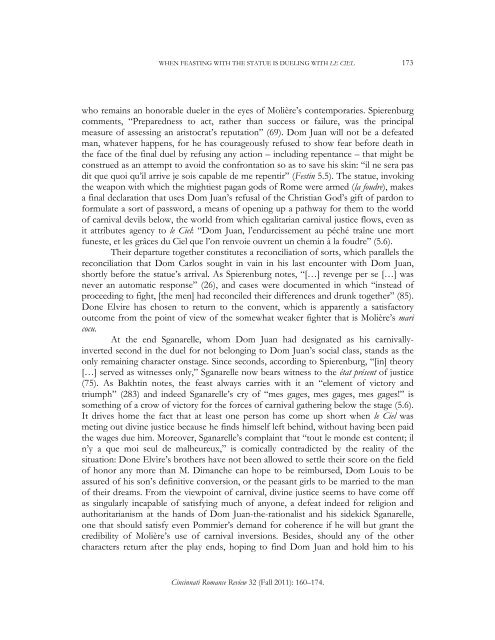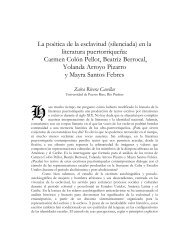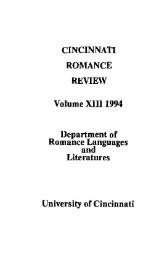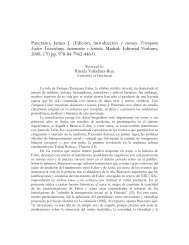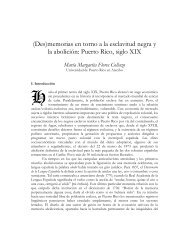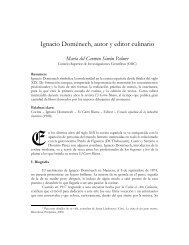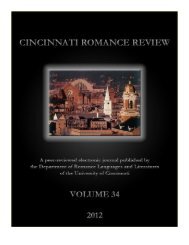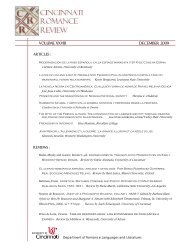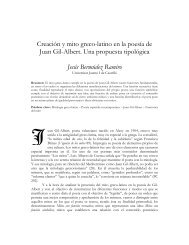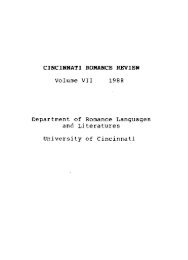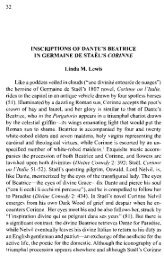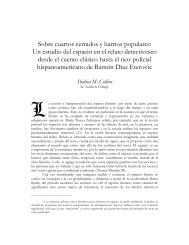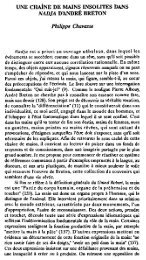Volume 32 (2011) - Cincinnati Romance Review
Volume 32 (2011) - Cincinnati Romance Review
Volume 32 (2011) - Cincinnati Romance Review
- No tags were found...
You also want an ePaper? Increase the reach of your titles
YUMPU automatically turns print PDFs into web optimized ePapers that Google loves.
WHEN FEASTING WITH THE STATUE IS DUELING WITH LE CIEL 173who remains an honorable dueler in the eyes of Molière’s contemporaries. Spierenburgcomments, “Preparedness to act, rather than success or failure, was the principalmeasure of assessing an aristocrat’s reputation” (69). Dom Juan will not be a defeatedman, whatever happens, for he has courageously refused to show fear before death inthe face of the final duel by refusing any action – including repentance – that might beconstrued as an attempt to avoid the confrontation so as to save his skin: “il ne sera pasdit que quoi qu’il arrive je sois capable de me repentir” (Festin 5.5). The statue, invokingthe weapon with which the mightiest pagan gods of Rome were armed (la foudre), makesa final declaration that uses Dom Juan’s refusal of the Christian God’s gift of pardon toformulate a sort of password, a means of opening up a pathway for them to the worldof carnival devils below, the world from which egalitarian carnival justice flows, even asit attributes agency to le Ciel: “Dom Juan, l’endurcissement au péché traîne une mortfuneste, et les grâces du Ciel que l’on renvoie ouvrent un chemin à la foudre” (5.6).Their departure together constitutes a reconciliation of sorts, which parallels thereconciliation that Dom Carlos sought in vain in his last encounter with Dom Juan,shortly before the statue’s arrival. As Spierenburg notes, “[…] revenge per se […] wasnever an automatic response” (26), and cases were documented in which “instead ofproceeding to fight, [the men] had reconciled their differences and drunk together” (85).Done Elvire has chosen to return to the convent, which is apparently a satisfactoryoutcome from the point of view of the somewhat weaker fighter that is Molière’s maricocu.At the end Sganarelle, whom Dom Juan had designated as his carnivallyinvertedsecond in the duel for not belonging to Dom Juan’s social class, stands as theonly remaining character onstage. Since seconds, according to Spierenburg, “[in] theory[…] served as witnesses only,” Sganarelle now bears witness to the état présent of justice(75). As Bakhtin notes, the feast always carries with it an “element of victory andtriumph” (283) and indeed Sganarelle’s cry of “mes gages, mes gages, mes gages!” issomething of a crow of victory for the forces of carnival gathering below the stage (5.6).It drives home the fact that at least one person has come up short when le Ciel wasmeting out divine justice because he finds himself left behind, without having been paidthe wages due him. Moreover, Sganarelle’s complaint that “tout le monde est content; iln’y a que moi seul de malheureux,” is comically contradicted by the reality of thesituation: Done Elvire’s brothers have not been allowed to settle their score on the fieldof honor any more than M. Dimanche can hope to be reimbursed, Dom Louis to beassured of his son’s definitive conversion, or the peasant girls to be married to the manof their dreams. From the viewpoint of carnival, divine justice seems to have come offas singularly incapable of satisfying much of anyone, a defeat indeed for religion andauthoritarianism at the hands of Dom Juan-the-rationalist and his sidekick Sganarelle,one that should satisfy even Pommier’s demand for coherence if he will but grant thecredibility of Molière’s use of carnival inversions. Besides, should any of the othercharacters return after the play ends, hoping to find Dom Juan and hold him to his<strong>Cincinnati</strong> <strong>Romance</strong> <strong>Review</strong> <strong>32</strong> (Fall <strong>2011</strong>): 160–174.


